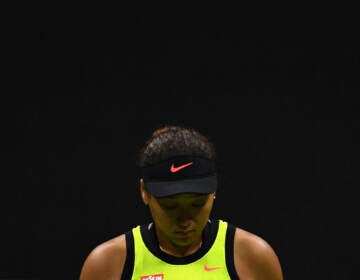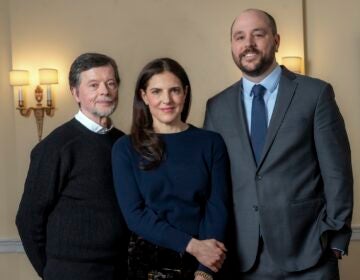‘It’s fun’: Bringing tennis, and a sport for them, to Camden’s girls
A program started under the auspices of the Centerville Simbas teaches girls as young as 5 how to wield a racket and hit a volley.
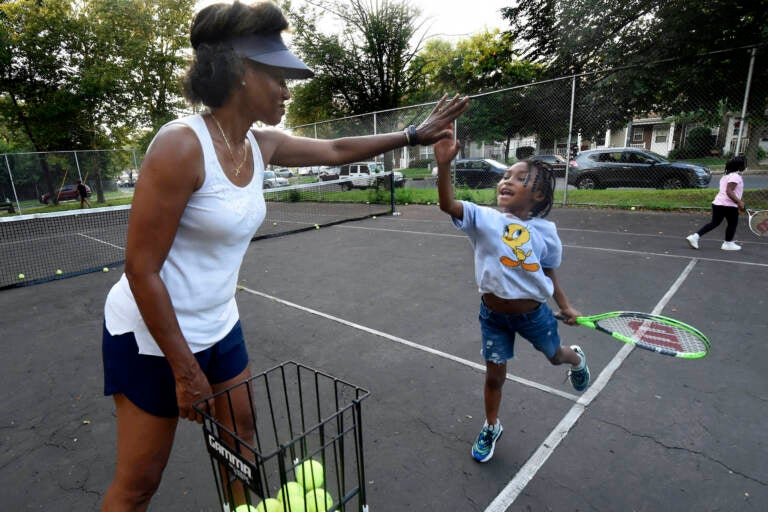
Kelly Cass-White gets a high-five from tennis student Harlem Lewis, 6 on Aug. 26, 2021. (April Saul for WHYY)
At a tennis court a stone’s throw from the railroad tracks in Camden’s Centerville neighborhood, 6-year-old Harlem Lewis keeps signaling coach Kelly Cass-White for just one more volley.
“I’ve been playing this for five years!” Lewis tells a reporter, then corrects herself. “No, for five days.”
Cass-White, a consultant for a utility company who grew up in Camden, points to one of the 17 girls who have gathered on weeknights this summer to learn the sport under the auspices of the Centerville Simbas — an organization founded in 1969 for boys in the city to play football.
“It’s exciting,” said Cass-White. “Two days ago, that girl couldn’t hit the ball!”
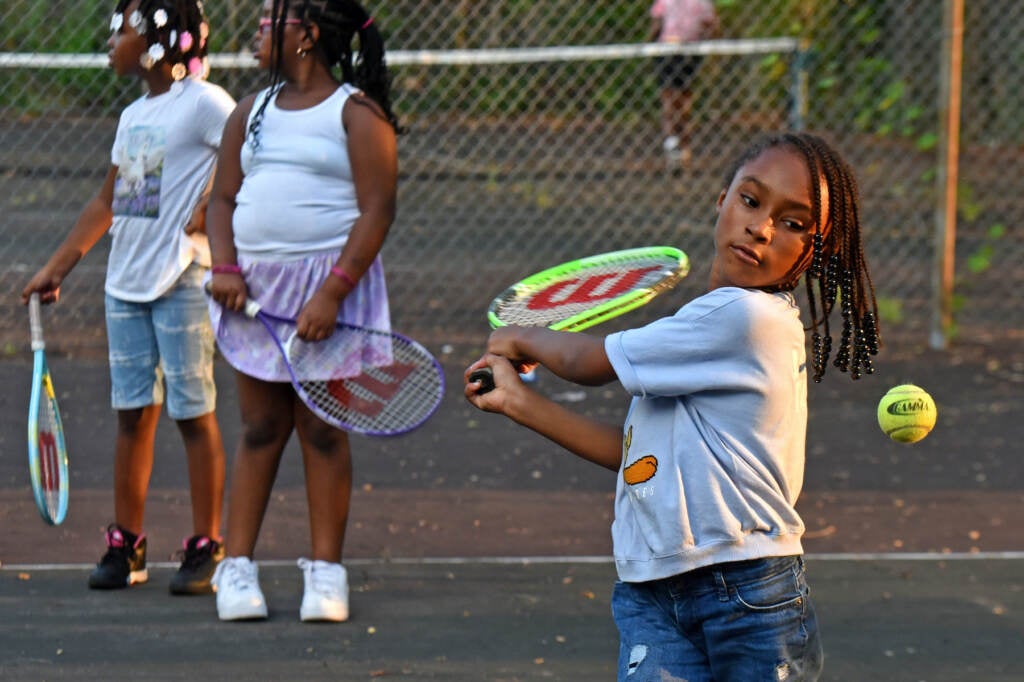
Cass-White was recruited by her friend and longtime Camden resident Orlando Council-Pettigrew to help him teach tennis to girls in the city. He retired from his job as a postal carrier two years ago, and recently decided that after three decades of coaching the Simbas football team, he was ready to leave that labor of love as well.
“Nothing was wrong,” he said, “but at 57 years old, it was time to get out of the way.”
For Council-Pettigrew, an accomplished tennis player in his youth, a lifelong love of the sport and a little girl named “Icebox” provided the inspiration.

In 2016, nearly 50 years after the Simbas’ inception, Council-Pettigrew got the chance to coach Janiyah Hill, a 7-year-old combination running back and quarterback and the first girl to play on the 75-pound squad. She was nicknamed “Icebox” after a character in the film “Little Giants.” Council-Pettigrew had coached her father and was also friends with her granddad.
At the time, Council-Pettigrew said working with Janiyah made him “excited about coaching again.” That experience, he said, led him to make this summer’s program exclusively for girls, though he hopes to make it coed in the future.
“In our city,” he said, “we literally get no money for programs for girls. We have basketball, football … but we have nothing strictly for little girls, sportswise.”
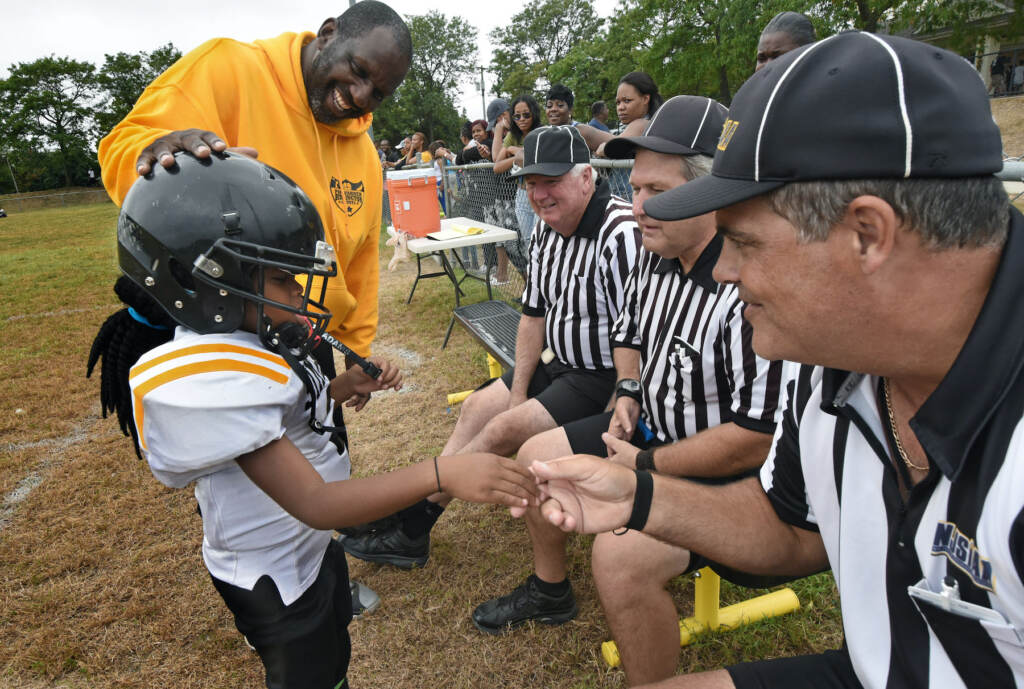
Nobody can remember exactly when tennis teams disappeared from Camden High and Woodrow Wilson high schools, but it was probably at least five years ago.
Council-Pettigrew is not the only person trying to bring tennis back to the city. Dr. Jack O’Byrne, executive director of the Camden County Historical Society, and Bridget Phifer, executive director of the Parkside Business & Community in Partnership (PBCIP), have been raising money to renovate the five rundown tennis courts between the Historical Society building and the Camden High football field on Park Avenue — with the hope of bringing tennis back to Camden High by spring 2023.
O’Byrne said that so far $50,000 of the $147,000 needed has been raised through grants, and that Camden Mayor Vic Carstarphen and School Board President Wasim Muhammad have promised to try to help with the rest. O’Byrne said it’s part of the society’s partnership with the school system to improve the baseball and softball fields, as well as the tennis courts — which are not eligible for state School Development Authority funding because they are not contiguous to the actual Camden High complex.
Though that brand-new building has been the focus of much attention, Phifer said, “you also need to have enhanced recreational opportunities for the kids … they need to feel good about where they are, whether it’s a baseball or softball field or a tennis court.”
Estelle “Cookie” Sey coached tennis at Camden High in the early 1980s, and, Council-Pettigrew said, “taught me everything I know about tennis.”
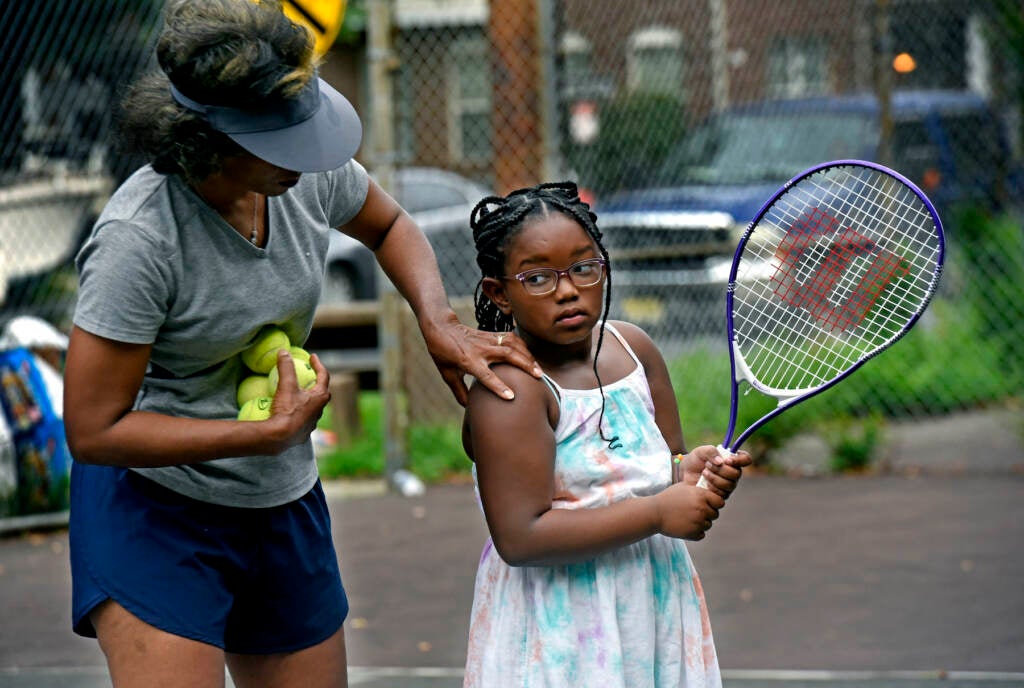
Sey was frustrated by the discrepancies in funding between her program and higher-profile sports. The school’s athletic director at the time, she said, “never really got me decent equipment … boys’ basketball and football players would even get sneakers!”
She quit, she said, when “I had enough of arguing that we needed Prince tennis rackets. We were playing Cherry Hill. The suburban schools had better equipment.”
Wes Fuller, who won accolades for both tennis and basketball at Camden High, playing with basketball legends like Milt Wagner before graduating in 1983, said he spent 12-hour stretches at the Dudley Grange courts in East Camden perfecting his tennis game as a youth.
Fuller recalled that he was the only Camden player to ever beat a Cherry Hill tennis team member. Both high schools in Cherry Hill still have competitive tennis programs, as well as many more sports options for girls than Camden schools do, such as volleyball, field hockey, and soccer.
Now living in Georgia, where he coaches teens to earn tennis college scholarships and recently had a former student compete in the U.S. Open, Fuller believes tennis hones different skills than other sports do.
“Tennis is what’s needed in Camden,” said Fuller, “because it teaches kids discipline, to be self-sufficient, and to believe in themselves. There’s no teammates, and in real life, if you want to be a doctor or lawyer, there’s not always a team. Our kids need confidence to achieve things and make wise decisions.”

Like Fuller, Camden City Councilman Angel Fuentes loved tennis as a teen, and at one point in the late 1970s was captain of the Woodrow Wilson High tennis team. He said he still plays with City Clerk Luis Pastoriza, who was on the Camden High team. Fuentes said he’s seen tennis courts in Camden used for soccer games and dirt bike riding, and would love to see the sport make a comeback in the city.

For Council-Pettigrew, moving from coaching football to teaching tennis required a few adjustments, including lowering his voice on the court.
“Kelly will say, ‘You just yelled in my ear!’” he said. “At football practice, you just have to scream and holler a lot just to be heard.”
When he explains to his students and their parents that he shouts because he used to be a football coach, Council-Pettigrew said, he also tells them that “the best tennis coach that I know of never played tennis and he was a screamer and a hollerer and very aggressive: Venus and Serena’s father” — a reference to Richard Williams, who started training his tennis champion daughters when they were as young as 4.
Council-Pettigrew charged the girls he was teaching, ranging in age from 5 to 14, $30 for the whole summer. Some paid, some didn’t — but all got to keep their rackets, as well as the Simbas apparel and school supplies he and Cass-White distributed.
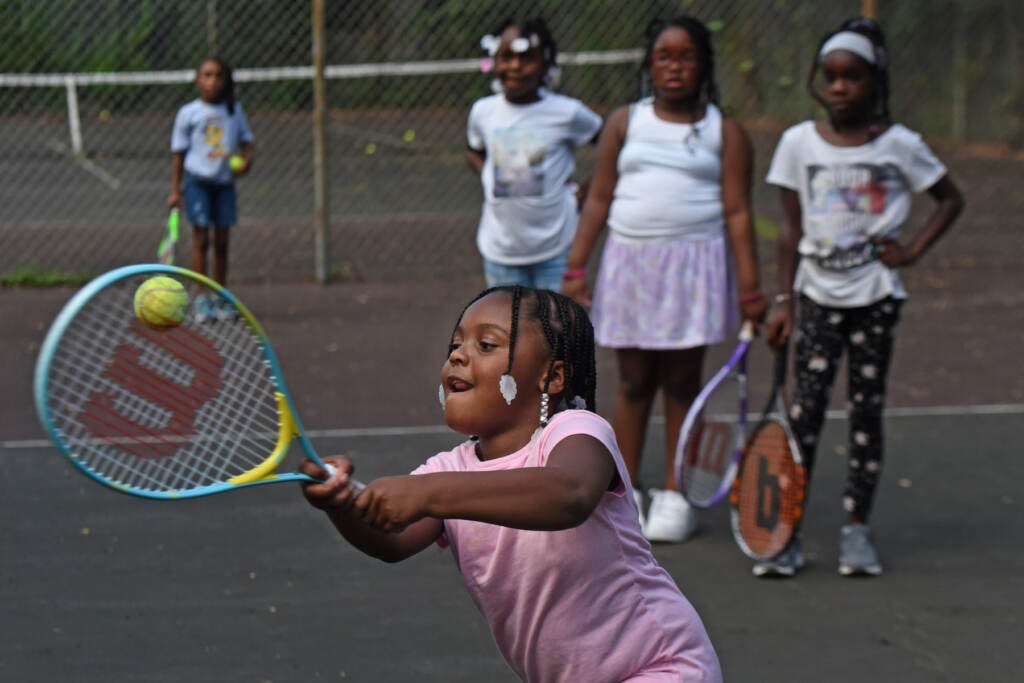
He doesn’t see funding as a stumbling block in bringing the sport back to his city, although he acknowledged that the dozen high schools Camden students can currently attend “divide the talent,” which makes it tougher to assemble teams.
“I don’t think it’s a lack of money,” said Council-Pettigrew. “If you get 10 kids who want to play tennis at Camden High, it’s not going to cost them that much. Right now, I have the equipment at my house, the hard part would be getting someone to coach it.”
For now, he and Cass-White are happy with the initial effort. They had planned to teach only Friday nights after school started — weather permitting — but their students kept showing up the first week of school, so they did, too.
Cass-White, who taught herself tennis as a teen, wishes she’d had a chance to learn at a younger age like her students.
“Eventually, this might lead to Camden High getting a tennis team,” she said. “Right now, we’re bringing the love of tennis to these girls, and we’re keeping them busy.”
Some of her pupils, she said, “leave here on Friday and say, ‘Can we have tennis tomorrow?’”
Ra’Kal Williams, 8, came for tennis instruction on her birthday in August.
“It’s fun,” she said, “and it helps my mom get a break.”

Appollonia Williams said tennis gave her daughter a chance to “channel her energy in the right direction.”
Council-Pettigrew maintains that the seed was planted by a second grader called “Icebox.”
“I can honestly say that coaching her rejuvenated me,” he said, “and that now, coaching these little girls is having the same effect.”
WHYY is your source for fact-based, in-depth journalism and information. As a nonprofit organization, we rely on financial support from readers like you. Please give today.




